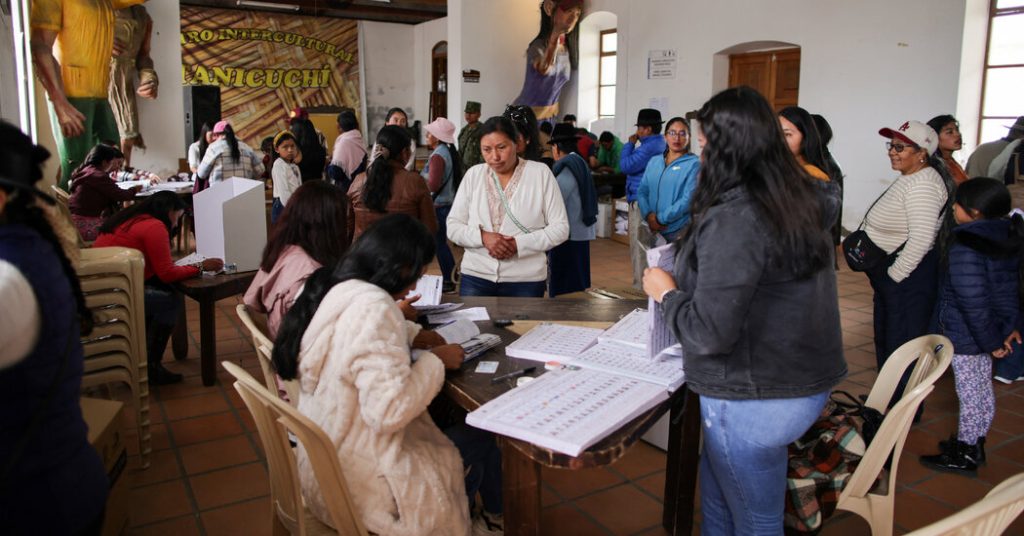Ecuador’s Presidential Election Heads to a Runoff: A Nation Divided
Ecuador’s young President, Daniel Noboa, known for his aggressive law-and-order policies and mastery of social media, has failed to secure a majority in his bid for re-election. With 96% of the ballots counted, Noboa garnered 44.37% of the votes, while his closest opponent, Luisa González, a leftist candidate, secured 43.86%. The tight race has forced a runoff election, scheduled for April 13, between the two candidates. This outcome reflects the deep ambivalence among Ecuadorians about Noboa’s hardline tactics amid a deteriorating security situation in the country, which has been plagued by drug-related violence for the past five years.
A Nation Grappling with Insecurity and Economic Hardship
Ecuador, a nation of nearly 18 million people, is at a crossroads. The country has been battered by a surge in gang violence, high unemployment, and an energy crisis that has left millions without electricity for hours each day. These challenges have driven tens of thousands of Ecuadorians to migrate north to the United States in search of better opportunities. The election has become a referendum on the direction the country should take to address these pressing issues.
Daniel Noboa, a 37-year-old Harvard-educated politician from one of Ecuador’s wealthiest families, rose to power in 2023 after winning a runoff election against Luisa González. His campaign capitalized on widespread frustration with escalating violence and the perceived ineffectiveness of previous governments. Noboa’s supporters praise his bold approach to combating crime, which has included deploying the military to patrol streets and prisons, as well as taking controversial actions such as raiding the Mexican Embassy to arrest a fugitive politician. However, critics warn that his methods undermine democratic norms and civil liberties.
Luisa González: A Symbol of Nostalgia for the Past?
Luisa González, a 47-year-old candidate from the party of former President Rafael Correa, has emerged as the main challenger to Noboa. Correa, a polarizing figure who dominated Ecuadorian politics for over a decade, is remembered fondly by many for his efforts to reduce poverty and stabilize the economy. However, his authoritarian style and corruption charges have left a complicated legacy. González’s campaign has tapped into nostalgia for the relative peace and prosperity of the Correa era, with her supporters arguing that her experience and focus on strengthening public institutions are what Ecuador needs to address its current crises.
A Divided Electorate: Support for Noboa and González
The election has exposed deep divisions within Ecuadorian society. Noboa’s supporters, like Juan Arias, a 32-year-old business owner, praise his tough-on-crime approach, seeing it as a necessary measure to restore security. “A president never has to compromise with anyone,” Arias said. “For me, that is what gives me security as a citizen.” On the other hand, González’s backers, such as Jonathan Andino, a childhood friend of Arias, argue that life was better under Correa’s leadership, with more jobs, economic stability, and access to health and education. “The problem is that Ecuadorians have no memory; they forget things,” Andino said.
The Challenges Ahead: Violence, Economic Crisis, and Democratic Erosion
Despite Noboa’s aggressive security measures, violence in Ecuador has continued to escalate. Drug trafficking has expanded, drawing in international criminal groups and unleashing unprecedented levels of violence in what was once a peaceful nation. Last month saw the highest number of violent deaths in three years, according to police data. Many Ecuadorians blame Noboa’s heavy-handed tactics for exacerbating the situation, particularly after the deaths of four children in a military operation in December sparked widespread outrage.
The country is also reeling from an energy crisis caused by a drought last year, which led to 14-hour daily power cuts for three months. This crisis paralyzed businesses and threatened entire industries. While Noboa’s campaign has focused on his image as a youthful and vigorous leader, critics argue that he has failed to present concrete proposals to address these challenges. González, on the other hand, has emphasized the need to strengthen institutions such as the justice, health, and education systems to build a more sustainable and peaceful future.
The Runoff: A Pivotal Moment for Ecuador’s Future
The runoff election on April 13 will determine the direction Ecuador takes in addressing its multitude of challenges. Noboa’s supporters see him as a bold leader willing to take unconventional steps to restore order, while González’s backers believe her experience and focus on institution-building are essential for long-term stability. As Ecuadorians prepare to cast their votes again, the stakes could not be higher. The outcome of this election will not only shape the country’s response to its immediate crises but also determine whether it continues down a path of democratic erosion or charts a course toward renewed prosperity and peace.












